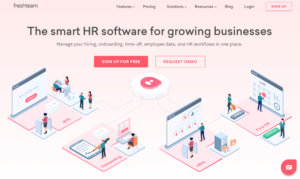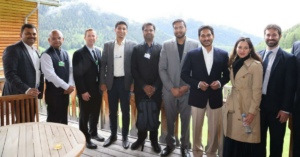CII’s annual Global Knowledge Summit is being held online on April 8-9 this week. The theme of the 16th edition of the summit is Transforming Knowledge Management for Hybrid Learning and Hybrid Workplaces.
As media partner for the Global Knowledge Summit, see YS’s coverage of the editions from 2021, 2020, and 2019, and sessions takeaways from the Bangalore K-Community meetups.
In this article, three speakers from Bosch, TCS, and Trianz share perspectives on digital transformation in the pandemic era, the rise of co-creation, and knowledge management (KM) tips for business leaders.
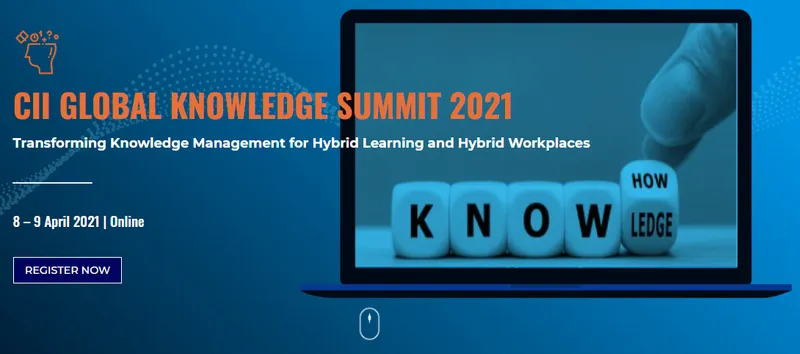
Skillsets for the hybrid workplace
“The primary skill required in the digital workplace is to be able to fluently communicate with the machine,” explains Manoj Hariharan, Chief Knowledge Management Officer at Bosch, in a chat with YS.
The second basic skill he identifies is discipline. “A state-of-the-art home office setup doesn’t necessarily ensure that you manage your time judiciously,” he adds.
“The third basic skill required is to remain connected. Despite all advancements in technology, humans have an innate need to remain connected and to feel part of a team,” Manoj observes.
Unfortunately, the digital workplace increases the divide and reduces the interaction. “Each of us needs to do new things to retain our connection to other humans,” he suggests.
Contextual knowledge, sensemaking, and agile value delivery are three skills for the hybrid workplace as identified by Shanthi Natarajan, Head, Delivery Excellence, Transformation Office, TCS.
“We need to develop a deep understanding of the business value chain – not only of the customer but of the customer’s customer,” she describes. We need to make sense of the continuously volatile, changing, ambiguous situations, and derive insights from hybrid ecosystems.
“Value delivery has to be agile. We need to be able to continuously deliver business value in a rapid, incremental, location-independent and impact-based manner while leveraging ecosystems,” Shanthi adds.
Ved Prakash, Chief Knowledge Officer of Trianz, identifies teamwork, digital acumen, and time management as key skills for the digital age.
“Teamwork and collaboration, coupled with networking skills, will work better when one has the ability to ask the right questions,” he adds. Digital savviness helps make the best out of the eclectic mix of digital tools for the hybrid workplace.
“Time management is important for keeping work-life balance intact. In a WFH scenario, the knowledge worker must be able to switch off from work for family time. Contrary to expectations, this was not the case during the lockdown-induced fulltime work from home,” Ved cautions.
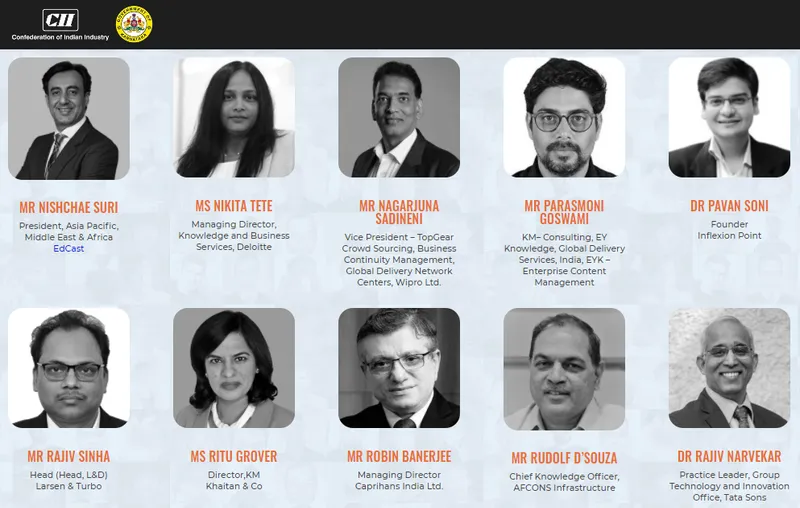
Future of Work
Knowledge workers will play a critical role in the hybrid nature of work, by designing co-bots with inbuilt institutional and contextual knowledge, Shanthi of TCS observes.
“Intellectual capital is critical for long-term success as a value differentiator. Even before the pandemic, organisations spent a lot of time and effort with employees trying to access reliable information and expertise,” she describes.
Knowledge ecosystems to access and internalise know-how can guide employees through successful customer conversations. “Knowledge workers will continue to enable curation, connection, collaboration, and cross-pollination of practices and learnings to enable organisational strategic objectives,” she adds.
Knowledge workers will continue to provide the crucial higher-order human element in judgment and decision making even as AI, automation, and machines gain prominence, according to Ved of Trianz.
“At the same time, a large number of knowledge workers will form the workforce of the future that will be required to enable AI, automation, and machines to be set up in the first place,” he adds.
“Knowledge workers have to take on the responsibility of ensuring that the organisation is as amazing as the individuals who make it,” Manoj of Bosch describes.
While machines, automation, and AI help humans achieve results faster, it is humans still who define what to achieve. “The value in the value chain is defined by humans. Knowledge workers therefore should focus on extracting, defining, and creating value,” he advises.
The new normal
The pandemic has made organisations across sectors realise the importance of managing knowledge well in an increasingly digital world, Ved of Trianz observes. “Remote work is here to stay in various hybrid forms, and the role of KM has become far more visible and critical now,” he adds.
“Structured KM is required to ensure that knowledge residing in laptops and minds moves to the cloud for the benefit of a much larger mass,” he suggests. KM will also be needed to embed AI in processes, for ensuring that the underlying knowledge has been understood and organised well.
“The importance of KM was accelerated when we entered the pandemic. We are more likely to reach the stable zone of the ‘S curve’ of digitalisation,” Manoj of Bosch says.
“What we need to do now is to look ahead to the next ‘S curve’ and prepare our organisations for it,” he explains.
Many companies are waking up now to the reality that “software is eating the world”, and KM has the task of neoskilling. “This involves reskilling and upskilling workers to the neo-software skills of data engineering, IT infrastructure, continuous deployment, and the likes,” he adds.
“KM will have the opportunity to positively impact many areas of business. Organisations have had to fall back on strengthening their KM practices to continue business operations, exhibit resilience, and develop or adapt to new business models and ecosystems,” Shanthi of TCS observes.
KM will play a pivotal role in this regard, for all stakeholders and levels in the organisation, and for the pillars of strategy, governance and culture. “TCS in fact leverages its Location Independent Agile™, a TCS proprietary methodology, which has built-in innovation and knowledge practices that enable enterprise-wide growth and transformations,” she describes.
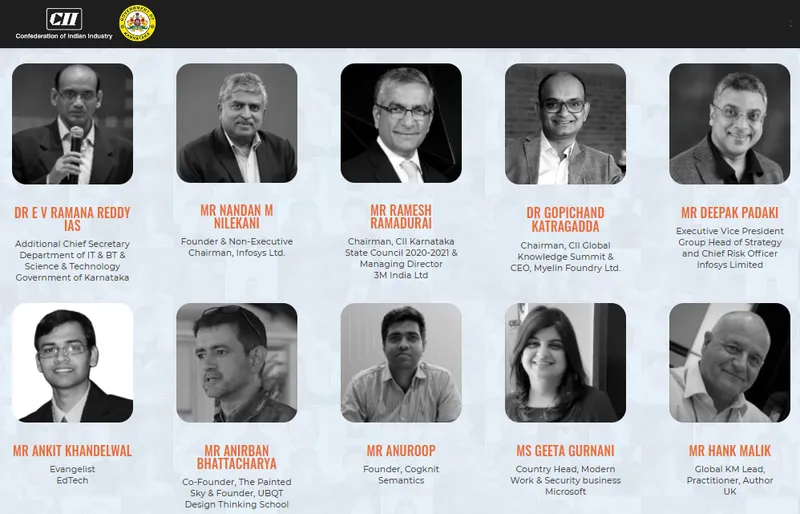
Trends
Knowledge-as-a-Service and knowledge-driven transformation that is digitally driven, impactful with disruptive innovations, and supported with measures for business results is the way forward, according to Shanthi of TCS.
The new normal will consists of maximum reusability of an organisation’s contextual and institutional knowledge base, along with personalised knowledge delivery at the time of need for business outcomes, she suggests.
“We have for long focused on making human-machine interaction (HMI) simple via use of advancements in technology. An emerging trend is looking at the HMI question through the prism of the human,” Manoj of Bosch observes.
From touch-based keyboards, we are now seeing the rise of voice-first devices. “We will see more machines, even industrial scale machines, operated by voice commands. Knowledge workers will have to sharpen their natural language processing skills to be relevant contributors in this growth story,” he advises.
“Knowledge work will see a tremendous transformation in the coming years in line with technological advancements,” Ved of Trianz suggests. A lot of knowledge work will move towards enabling and leveraging emerging technologies and their derived insights.
“At the high end of judgement and decision making, knowledge work will continue to remain with real people. I don’t foresee machines mimicking humans in the true sense in the foreseeable future,” Ved observes, though some repetitive tasks or well-defined rule-based processes will be automated.
“Another related domain that will see interesting movements is the human-machine interface. A robot may earn a seat in the board on merit sooner than later,” he adds.
“With abundance of information and democratisation of knowledge thanks to social media, knowledge work will increasingly come under the scanner for regulatory compliance,” Ved observes, pointing to alarming incidents of bias, deep fakes, and the like.
The power of the crowd will increase, and sensory knowledge will gain prominence over the written word in terms of consumption preferences, he adds.

Co-creation
“Co-creation as an idea has been maturing fast, as seen during the handling of the pandemic. After initial hiccups, a lot of SOPs, solutions, drug development, and vaccination programmes got accelerated thanks to co-creation,” Ved observes.
Mega projects that require enormous resources have also been thriving due to co-creation, such as CERN and the genome project.
“Co-creation comes with its own baggage as biases of various types can creep in,” Ved adds, pointing to the controversy over the co-created toolkit shared by Greta Thunberg during farmers’ protests in India, as an example.
“We have a lot of uncertainty and unpredictability precisely because we are focused on individuals and single companies. If we simply shift away from this What’s in it for me? and recognise that we are far more interconnected than we understand, then a lot more can be achieved with a lot less VUCA,” Manoj of Bosh advises.
“Under increasing uncertainty and unpredictability, traditional approaches will not help to handle new-age demands and risks. Value co-creation will be the way in an age of uncertainty where larger wisdom is leveraged and employees are empowered to solve challenges,” Shanthi of TCS observes.
“Innovation has become a fundamental building block in uncertain times. Co-creation can generate a wealth of ideas to improvise existing or create new strategy and solutions,” she adds.
This will lead to economic benefits, stakeholder collaboration, and improved workplace experience. “The ability to develop and sustain ecosystems will be a key capability for any organisation,” Shanthi affirms.

Tips and advice
The speakers end with tips for business leaders on organisational purpose, structure, and culture.
“Organisations of tomorrow will no longer be able to scale or sustain with a command-and-control structure,” Shanthi of TCS cautions.
Business leaders must enable and sustain an empowered environment and culture. “Organisations that provide a platform to integrate employee aspirations, ecosystems, and organisational strategic objectives or goals seamlessly will differentiate themselves,” she describes.
“They will benefit from their self-organising and purpose-driven teams, ecosystem play, and customer centricity,” she adds.
“Put the organisation at the centre, not yourself,” Manoj of Bosch advises.
“Business leaders, especially those from Gen X and Gen Y, need to get away from the command and control hierarchical mindset they have grown up in,” advises Ved of Trianz.
They need to accept the fact that the more recent digital-native workforce thinks and acts differently, and should be given the space and freedom for doing things differently. “Let the ideas coming from the bottom bubble up smoothly and give them due importance,” he recommends.
This calls for humility and harmony, while working with internal and external stakeholders for a common goal.
“All these qualities exhibited by the leaders will give confidence for employees to work in a conducive environment. This in turn will build the desired culture,” Ved signs off.


